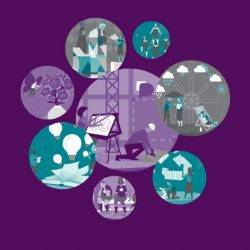November 9, 2018
Poor support offered to professional women returning from maternity leave
 A new survey of professional, mainly management-level women has revealed a lack of support for maternity returners by employers. According to the survey by working parents website MMB, more than four fifths of pregnant women begin their maternity leave unhappy and lacking in confidence about work – and over a third feel so isolated when they return that they want to hand their notice in. The survey of more than 1,000 mothers, 72 percent of whom were in jobs at management level or above found that only 18 percent of maternity returners felt happy and confident about work – having seen the way previous maternity returners had been dealt with by their employer. Over a third (37 percent) felt so unsupported and isolated on their return that they wanted to leave and just 17 percent felt they received good communication and support through the maternity process.
A new survey of professional, mainly management-level women has revealed a lack of support for maternity returners by employers. According to the survey by working parents website MMB, more than four fifths of pregnant women begin their maternity leave unhappy and lacking in confidence about work – and over a third feel so isolated when they return that they want to hand their notice in. The survey of more than 1,000 mothers, 72 percent of whom were in jobs at management level or above found that only 18 percent of maternity returners felt happy and confident about work – having seen the way previous maternity returners had been dealt with by their employer. Over a third (37 percent) felt so unsupported and isolated on their return that they wanted to leave and just 17 percent felt they received good communication and support through the maternity process.










 Figures from Macmillan show that almost 900,000 people of working age (16-64) are living with cancer – a figure expected to rise to over a million by 2030, while the HSE disclosed 600,000 workers needed time off in the past year due to suffering from work-related stress, depression or anxiety. Men are notoriously bad at checking their health but according to Bupa an increasing spotlight on issues such as prostate cancer and testicular cancer earlier this year led to an increase in male health assessment bookings. In March 2018, Bupa saw a 28 percent uplift in male health assessment bookings compared to the same time last year, and a 43 percent year-on-year increase in April 2018. But according to the healthcare provider, employers must more efforts to help create a culture where male workers can open up about mental or physical problems.
Figures from Macmillan show that almost 900,000 people of working age (16-64) are living with cancer – a figure expected to rise to over a million by 2030, while the HSE disclosed 600,000 workers needed time off in the past year due to suffering from work-related stress, depression or anxiety. Men are notoriously bad at checking their health but according to Bupa an increasing spotlight on issues such as prostate cancer and testicular cancer earlier this year led to an increase in male health assessment bookings. In March 2018, Bupa saw a 28 percent uplift in male health assessment bookings compared to the same time last year, and a 43 percent year-on-year increase in April 2018. But according to the healthcare provider, employers must more efforts to help create a culture where male workers can open up about mental or physical problems.
 Over half of home workers say they appreciate the benefits that home working offers but nearly a quarter complain of loneliness too, a new survey from BHSF claims. When asked how working from home makes them feel, the top three responses were: free (50 percent), in control (47 percent) and calm (46 percent). However, a significant number of those surveyed chose more negative words to describe their feelings. Just over a quarter (26 percent) said that working from home made them feel remote, 24 percent felt isolated and 21 percent lonely.
Over half of home workers say they appreciate the benefits that home working offers but nearly a quarter complain of loneliness too, a new survey from BHSF claims. When asked how working from home makes them feel, the top three responses were: free (50 percent), in control (47 percent) and calm (46 percent). However, a significant number of those surveyed chose more negative words to describe their feelings. Just over a quarter (26 percent) said that working from home made them feel remote, 24 percent felt isolated and 21 percent lonely. 




 Workers are increasingly introducing technology devices, software and other tools into the workplace without their employer’s approval, claims a new report from NextPlane that examines the extent of this growing rift and its impact on collaboration and productivity. Nearly half of professionals (46 percent) said they or their team have introduced new technology into their workplace, and despite IT attempts to remain in control, workers are not standing down, as 53 percent said they or another team have pushed back on IT or management when they tried to dictate the technology they use.
Workers are increasingly introducing technology devices, software and other tools into the workplace without their employer’s approval, claims a new report from NextPlane that examines the extent of this growing rift and its impact on collaboration and productivity. Nearly half of professionals (46 percent) said they or their team have introduced new technology into their workplace, and despite IT attempts to remain in control, workers are not standing down, as 53 percent said they or another team have pushed back on IT or management when they tried to dictate the technology they use.


 People and machines are entering a new era of learning in which artificial intelligence (AI) augments ordinary intelligence and helps people realise their full potential. But CIOs need to prepare workers for a future in which people do more creative and impactful work because they no longer have to perform many routine and repetitive tasks, according to analysts speaking at the
People and machines are entering a new era of learning in which artificial intelligence (AI) augments ordinary intelligence and helps people realise their full potential. But CIOs need to prepare workers for a future in which people do more creative and impactful work because they no longer have to perform many routine and repetitive tasks, according to analysts speaking at the 
 The gig economy has helped lead to the doubling in size of the flexible office space sector since 2014 and it’s set to grow by up to 30 percent per year over the next five years claims new research published by JLL. Disruption or Distraction, a report delving into the growth of flexible office space across Europe explores the main drivers of the sector’s boom – including evolutionary changes in how, when and where people work, shifts in lifestyle, and rapid advancements in technology – and provides unique insights into the risks and rewards for both companies and real estate investors in Europe.
The gig economy has helped lead to the doubling in size of the flexible office space sector since 2014 and it’s set to grow by up to 30 percent per year over the next five years claims new research published by JLL. Disruption or Distraction, a report delving into the growth of flexible office space across Europe explores the main drivers of the sector’s boom – including evolutionary changes in how, when and where people work, shifts in lifestyle, and rapid advancements in technology – and provides unique insights into the risks and rewards for both companies and real estate investors in Europe. 





















